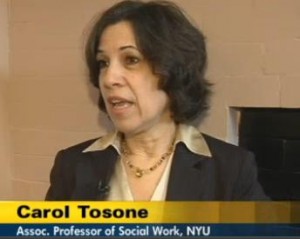Study Shows Trauma Can Be Shared Experience
Carol Tosone, an associate professor of social work at NYU, lived through the September 11, 2001 terrorist attack and is still spooked by the sound of planes flying overhead.
She wondered whether other social workers and mental health providers who treated 9-11 victims shared similar trauma.
So she did a survey of 500 clinicians who were in Midtown and Lower Manhattan during the attacks. That study proved many share trauma with the people they are treating, according to this article and television news clip on NY1.
Tosone hopes her study, which is being replicated in New Orleans among clinicians who counseled flood survivors, will help prepare social workers and others to work in disasters and other traumatic situations.
“We need to refortify clinicians,” said Tosone, who is also a member of the National Association of Social Workers.
To learn more about how social workers help survivors of disasters click here to visit NASW’s “Help Starts Here” and read about how California social worker Dina Ortiz, LCSW, traveled to the Gulf Coast to help victims of Hurricane Katrina.
| Leave A CommentAdvertisement
5 Comments
Leave a Comment
You must be logged in to post a comment.




It is so important to acknowledge Secondary Post Traumatic Stress Syndrome in the professionals that treat trauma victims. The healthcare workers and the social workers were certainly traumatized themselves during the horrific events of 911.
I was in Chicago on Sept 11th but visited NYC, my hometown, shortly thereafter. I was traumatized myself when I had the honor of talking extensively to one of the firefighters who responded to 911 and who was then working on the recovery effort. He had lost many friends and his firefighter nephew whose remains they had personally recovered that very afternoon.
Thank you Carol for legitimizing this fact with your evidence based study.
and social workers who work directly with Soldiers returning from the battlefield. That could be a whole other topic.
This study is of amazing value to all helping professionals who suffer in silence due to the nature of their work. Please have a look at our book, “Second-Hand Shock: Surviving and Overcoming Vicarious Trauma.” This silent thief robs the helper of their health and well-being. Pedestal Professionals are expected to absorb unspeakable levels of trauma with no effects. Thank goodness, this faulty perception is being corrected with the help of this type of research. Anytime a professional helper listens to trauma content while having to control their empathic response, they are experiencing Second-Hand Shock. This type of trauma includes a ratcheting up and down of brain chemicals that culminates with the overproduction of cortisol. Too much cortisol can lead to a myriad of physical illnesses which includes, cancer, rheumatoid arthritis, suppressed immune response, adult onset diabetes, inflammations, hypertension, etc., etc. Thank you, Carol for your dedication to helping our heroes!
I am a Social Worker from Melbourne, Australia and I think the experience of social workers who were involved in the recent bushfires in Victoria and the floods in Queensland would be similar to our colleagues in USA, although we fortunately have not encountered the scale of trauma as 9/11. Professionals helping victims are often going through their own trauma, loss and grief and have to cope with their own personal reactions as well as that of the clients they are assisting. Primary and secondary trauma are involved here.
Originally from N.Y., I wasn’t anywhere close to the WTC, the Pentagon or Pennsylvania location of the 9/11 attacks. I was actually at the Community Counseling Center at Marine Corps Base, Camp Lejeune. I recall myself, clients and other clinicians sitting in the waiting area of the counseling center in stunned disbelief, at what we were seeing on the news. Subsequently I worked at the Deployment Health Center at Camp Lejeune. There I saw hundreds of Service Members returning from combat deployments; a direct result of the 9/11 attack. The question of the psychological toll that clinicians working with trauma populations is a very worthwhile one, that I think involves a lot of self-care and monitoring of how our co-workers are doing, similar to the efforts we need to make to ensure the physical safety and security for patients and staff in mental health settings.